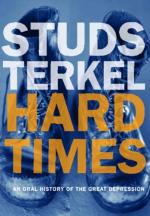
|
| Name: _________________________ | Period: ___________________ |
This test consists of 15 multiple choice questions and 5 short answer questions.
Multiple Choice Questions
1. What happened to Orrin Kelly after the incident with the Iowa judge?
(a) He interviewed the leaders of the mob.
(b) He became judge of the county.
(c) He had to flee town.
(d) He was arrested.
2. When were the collectivized camps outside of urban centers closed?
(a) The seventies.
(b) When America entered World War II.
(c) When Roosevelt died.
(d) When the stock market crashed.
3. What did the prison where Scoop Lankford was held in the 1930's try to feed the inmates at the worst times?
(a) Rotten sardines.
(b) Gruel.
(c) Shark.
(d) Gristle.
4. According to Samuel A. Heller, what did police often do with arraigned people awaiting trial in the 1930's?
(a) Have them shine their shoes.
(b) Beat them for fun.
(c) Have them sing for their entertainment.
(d) Pawn them off to construction crews.
5. What did the Chicago Worker's Alliance protect against?
(a) Health violations.
(b) Employer intimidation.
(c) Evictions.
(d) Relief fraud.
6. Why did Huey Long not run for president in 1936?
(a) He was assassinated.
(b) He chose to retire.
(c) He was embroiled in scandals.
(d) He became Roosevelt's Chief of Staff.
7. According to Buddy Blankenship in Sixteen Ton, what did coal companies often pay instead of money?
(a) Company vouchers.
(b) Coal.
(c) IOUs.
(d) Food rations.
8. According to historian Christopher Lasch, what was never a serious possibility in the Depression?
(a) Loss of personal freedom.
(b) Revolution.
(c) A right-wing reaction.
(d) Annexation by Canada.
9. What writer did Ray Wax take as his model during the Depression?
(a) Upton Sinclair.
(b) Horatio Alger.
(c) John Steinbeck.
(d) F. Scott Fitzgerald.
10. In 1930's Appalachia, what does the KKK assist in setting up?
(a) Town hall meetings.
(b) Progressive political rallies.
(c) UMW locals.
(d) Church raisings.
11. What does Emma Tiller say in her interview is as important as money?
(a) Dignity.
(b) Faith.
(c) Work.
(d) Companionship.
12. What is the name of the sketch programs Neil Schaffner performed in troupes across the country?
(a) Repertoire.
(b) Penny entertainments.
(c) Acts.
(d) Country-stories.
13. What does the young man in the final interview of Arrests and Other Running Sores do for a living?
(a) Repo man.
(b) Public defender.
(c) Convenience store clerk.
(d) Student.
14. As described in The Farmer Is the Man, how did a mob respond to a judge who was foreclosing on homes in Iowa?
(a) They burned down his house.
(b) They lobbied to have him removed.
(c) They tarred and feathered him.
(d) They lynched him.
15. What did Harry Hartman do in the 1930's when he felt bad for the indebted people he was serving?
(a) He would buy them a taxi to a shelter.
(b) He would leave some belongings behind.
(c) He would say they were not home.
(d) He would give them the address of a Worker's Alliance.
Short Answer Questions
1. According to Max Shachtman, why was Communism especially vital just before FDR was elected?
2. What popular American novel did Jack Kirkland adapt into a successful play?
3. Besides attempting to change the makeup of the Supreme Court, what Roosevelt decision does James Farley say alienated people in the administration?
4. Dr. Francis Townsend's ideas eventually became the groundwork for what?
5. According to Buddy Blankenship in Sixteen Ton, what was the state of coal miners before the Depression?
|
This section contains 569 words (approx. 2 pages at 300 words per page) |

|




